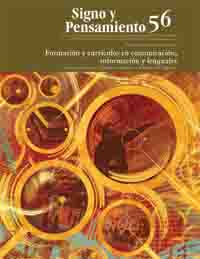Abstract
This work seeks to link a number of curriculum-related concepts, and to explore the way they influence both the practice and the effects of training in students. It also presents the dimensions of curriculum development, which transforms this topic and the actions related to it into a problematic field whose solutions must be based on reflection based on practices, needs, and expectations of those who participate in it. Finally, it provides some elements that, as a whole, constitute what today is called curriculum quality assurance.
— (2009), Las prácticas de gestión curricular: corazón de la dinámica de formación de la escuela, Bogotá, DIE-CEP.
Apple, M. (1970). Relevance and Curriculum: a study in phenomenological Sociology of knowledge. New York, Columbia University.
Bobbit, F. (1924), How to Make a Curriculum, Boston (MA), Houghton Mifflin.
Campo, R. y Restrepo, M. (s. f.), Documento de trabajo.
Campo, R. y Restrepo, M. (1996), Un modelo de seminario para estudios de postgrado, Bogotá, FEI-Universidad Javeriana.
Casares, M. (s. f.), Una reflexión teórica del currí- culum y los diferentes enfoques curriculares, La Habana, ucf.
Caswell, H. L. y Campell, D. (1935), Curriculum Development, New York, American Book Company.
Coll, C. (1987), Psicología y currículo, Barcelona, Laia.
Dewey, J. (1916[2001]), Democracia y educación. Madrid: Morata.
Freire, P. (1974), La educación como práctica de la libertad, Buenos Aires, Siglo xxi.
Gagné, R. (1967), Investigación del currículo y la promoción del aprendizaje, México, Interamericana.
Gimeno, J. (1988), El currículo : una reflexión sobre la práctica. Madrid, Morata. 1a. Edición. Good, C. (1973), Diccionario de educación, Nueva York, McGraw Hill.
Grundy, S. (1998), Producto o praxis del currículo, Madrid, Morata.
Habermas, J. (1972), Conocimiento e interés, Madrid, Taurus.
IDEP-Colciencias, Prácticas de gestión curricular en niveles educativos de preescolar, básica y media, informe de investigación [inédito].
Johnson, M. (1967), “Definiciones y modelos en la teoría del currículo”, en Giroux, A. (1981), Currículo e instrucción, Richmond (CA), McCutchan.
Kemis, S. (1988), El curriculum. Más allá de la teoría de la reproducción, Madrid, Morata.
— (1993), El currículo más allá de la teoría de la reproducción, Madrid, Morata.
Lundgren, U. (1997), Teoría del currículum y escolarización, Madrid, Morata.
Orozco, L. E. (1994), Conferencia en evento sobre Ciencia, Tecnología y Desarrollo Humano, Pereira, Universidad Tecnológica de Pereira.
Panza, M. (1990), “Notas sobre planes de estudio y relaciones disciplinares en el currículo”, en Perfiles Educativos, p 42.
Pontificia Universidad Javeriana, Prácticas de gestión curricular en cuatro carreras universitarias, informe de investigación [inédito].
Ragan, W. B. (1970), Currículo primario moderno, Porto Alegre, Globo.
Sacristán, J. G. (1998), El currículo. Una reflexión sobre la práctica, Madrid, Morata.
— (1996), Comprender y transformar la enseñanza, Madrid, Morata.
Sacristan, G. y Pérez, G. A. (1983). La enseñanza: su teoria y su práctica, Madrid, Akal.
Scurati, C. (1982), “Dal programma alla programazione: L’ipotesi del curricolo”. En: Frab- boni, F. (1982), L’innovazione Nella Scuola elementare. Florencia, La nuova Italia.
Stenhouse, S. (1991), Investigación y desarrollo del currículo, Madrid, Morata.
Taba, H. (1982), Desarrollo del currículo. Teoría y práctica, Madrid, Morata.
Tanner, D. y Tanner, L. (1980). Curriculum Development. Theory into Practice. New York, Macmillan.
Tyler, R. (1973), Principios básicos del currículo, Buenos Aires, Troquel.
Wheeler, D. K. (1976), El desarrollo del currículo escolar, Madrid, Santillana.
Zabalza, M. (1987), Diseño y desarrollo curricular, Madrid, Narcea S. A.
This journal is registered under a Creative Commons Attribution 4.0 International Public License. Thus, this work may be reproduced, distributed, and publicly shared in digital format, as long as the names of the authors and Pontificia Universidad Javeriana are acknowledged. Others are allowed to quote, adapt, transform, auto-archive, republish, and create based on this material, for any purpose (even commercial ones), provided the authorship is duly acknowledged, a link to the original work is provided, and it is specified if changes have been made. Pontificia Universidad Javeriana does not hold the rights of published works and the authors are solely responsible for the contents of their works; they keep the moral, intellectual, privacy, and publicity rights.
Approving the intervention of the work (review, copy-editing, translation, layout) and the following outreach, are granted through an use license and not through an assignment of rights. This means the journal and Pontificia Universidad Javeriana cannot be held responsible for any ethical malpractice by the authors. As a consequence of the protection granted by the use license, the journal is not required to publish recantations or modify information already published, unless the errata stems from the editorial management process. Publishing contents in this journal does not generate royalties for contributors.


